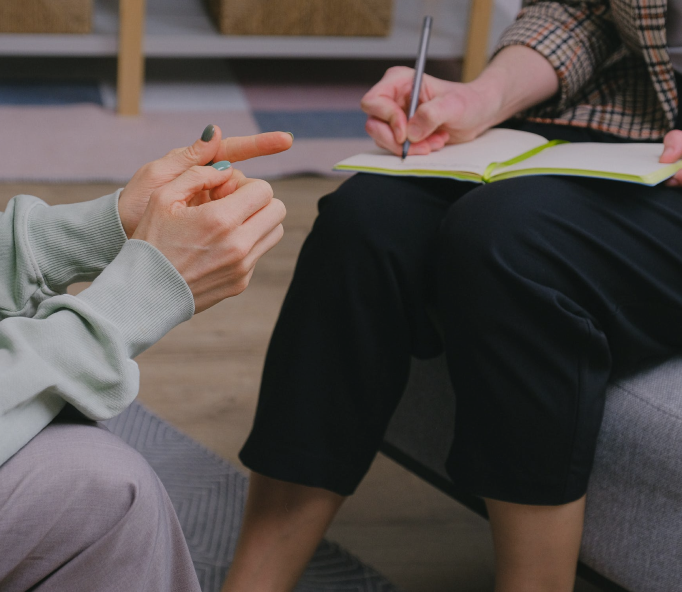Art Therapy For Mental Health & Substance Abuse
Exploring Art Therapy For Mental Health & Substance Abuse Recovery
Art has always been regarded as a balm for the soul and a channel for creative self-expression. Art therapy takes advantage of this and turns these benefits toward healing. Creative and artistic expression unlocks different areas of the mind.
The evidence-based modality offers an opportunity to explore past experiences, thoughts, emotions, and harmful patterns and to seek balance. The act of creating or experiencing something new can release a fresh perspective, enhance self-esteem, and create a new space for empowerment and renewal amidst the overwhelming challenges of addiction and co-occurring mental health disorders.
At MARC, we are invested in your long-term, sustainable recovery and healing. Art therapy is one of the many interventions we employ in our community-focused and immersive treatment process. We welcome you to our safe space and are eager to partner with you in your recovery.
What is Art Therapy For Mental Health & Substance Abuse?
Art therapy transforms creative pursuits into guided therapy sessions. This intervention is a complementary modality to the traditional psychotherapy and behavioral therapies that are common for substance use and mental health conditions.
Art therapy is a form of expressive therapy that employs creative mediums to improve mental health, physical wellness, and emotional well-being.[1] This alternative approach has also been shown to benefit those who suffer from:[2]
- Anxiety
- Depression and mood disorders
- Stress
- Trauma
- Grief
- Chronic pain
- Physical ailments (like cancer)
The use of art as therapy will be administered by skilled providers and therapists in both individual and group therapy sessions. Art therapy helps to explore, create, process, and respond to thoughts, behaviors, experiences, and harmful patterns in a safe environment.
The signature community-integration model for addiction treatment we employ at MARC is uniquely suited to art therapy as you can also learn from the experiences of others, the stories they share, and the art they create. We’re committed to walking alongside you as you leverage the power of art to pursue recovery.
How (and Why) Art Therapy For Mental Health & Substance Abuse Works
Art therapy sessions provide a creative outlet for thoughts and emotions and help you develop creative coping skills that improve or enhance the following aspects and traits:[3]
- Personal Development: Build stronger self-awareness, freedom of self-expression, and greater emotional intelligence.
- Non-Verbal Expression: By integrating kinaesthetic, symbolic, sensory, and perceptual mediums in innovative ways, you can communicate complex ideas, emotions, and experiences that words alone could never accomplish.
- Stress and Anxiety Reduction: Creativity and art are natural balms for the soul and soothe the body and mind.
- Mood and Quality of Life: Art therapy helps you learn to control undesirable behaviors, delay cognitive regression, and improve quality of life.
- Social Engagement: Community-based art-making is specifically beneficial for improving mental wellness and increasing one’s personal sense of value, making social engagement and connection easier.
- Healing and Trauma Processing: Art therapists set therapeutic goals and objectives for each session using the materials and mediums they select. With guided sessions, clients can better understand and heal from trauma.
- Boost Confidence: This creative therapy approach helps to reinforce a sense of self-worth and competence, which can elevate self-esteem and confidence.
Art therapy blends the physical with the mental and the emotional with the spiritual to provide a therapeutic outlet for expression and release. This contributes to a holistic and comprehensive recovery process.
Efficacy of Art Therapy For Mental Health & Substance Abuse
Art therapy for drug and alcohol addiction or mental illness offers outcomes and benefits that reach beyond formal treatment sessions. The benefits of art therapy bleed into self-care, potential, quality of life, and personal wellness in fresh new ways.
With regard to substance abuse, art therapy sessions can help reduce shame, treatment resistance, and general addiction denial.[4] It also helps to open new, healthy communication channels and increase motivation to make positive changes which are both practical and helpful during the long-term scope of the addiction recovery process.[5]



What to Expect from Art Therapy For Mental Health & Substance Abuse at MARC
At Maryland Addiction Recovery Center, our community-integrated recovery model supports your transformation from day one with never-ending support. Our art therapy program is embedded within several levels of care and may be included as part of your individualized treatment plan.
Guided by a skilled and experienced art therapist, creative sessions will follow this or a similar structure and flow:[6]
- We’ll review goals together and set clear intentions for the session.
- Artistic mediums and materials available will vary from session to session but may include crafts, painting, ceramics, music, dance, and more.
- Begin your own creative process according to the instructions provided while the therapist observes.
- We’ll review your project together and discuss it in detail.
- You will receive feedback from the therapist about your project as is relevant to the intention set at the beginning of the sessions.
- At the end, we will discuss ongoing treatment goals, review the current session, prioritize future goals, and discuss any potential homework.
Come and Heal Within The MARC Recovery Community
Creative arts therapy is so much more than a treatment intervention. It’s an avenue for holistic healing and self-expression. In many cases, substance use and mental health challenges hold us back from our highest potential, like living life through a thick fog.
Through the use of art therapy, you can unlock different areas of the brain, explore past experiences, identify harmful thoughts, process complex emotions, and reduce harmful patterns to find restoration and balance. We at MARC are eager to be your partner in healing and recovery.
Our approach to treatment includes the option for an immersive sober living component where you will be surrounded by like-minded peers and supported by staff available 24/7. Our mission is to support you through the long-term process of transformative recovery, not just through the completion date of structured treatment programs. Our levels of care include

Extended Care (PHP)
Extended Care programming at MARC offers the most structured treatment and living support in a community reintegration approach to care. All clients participate in individual and group therapy sessions, family therapy, psychiatry, and other evidence-based interventions.
Learn More
Intensive Outpatient Program (IOP)
The IOP program is offered during the day and in the evening, between three to days per week, and includes many of the same activities and sessions as our PHP program with a little more schedule flexibility. This level of care may also include a sober living component.
Learn More
Outpatient Program (OP)
Outpatient programming is a long-term program that supports your treatment progress as you build more personal autonomy. You will attend regular individual and group therapy sessions as scheduled by your treatment plan. This level of care is a core component of our community lifestyle treatment model and may include academic and vocational support as you build your new life.
Learn More
Family Program
Family members are essential to recovery. They also need additional support and education to navigate these challenging times with you and pursue their own healing.
Learn More
Alumni
At MARC, support doesn’t end after formal treatment. We’re invested in your long-term success and offer practical support to help you maintain your new sober life. Our alumni program offers ongoing therapy and access to vital resources within our thriving recovery community.
Learn More✦ Frequently Asked Questions ✦
About Recovery and Art Therapy For Mental Health & Substance Abuse
The most common therapy modality used in substance abuse treatment is cognitive behavioral therapy (CBT). This is a form of talk therapy that helps you identify harmful thought patterns that can lead to or influence harmful behaviors. You will be equipped with practical coping skills to help you cultivate new, healthy patterns and thereby improve behavior.
Absolutely. Art therapy for substance abuse and mental health issues is a respected and helpful intervention. At MARC, we have seen the benefits firsthand. However, it’s worth noting that any one single therapy is not a cure. Like all other interventions, art therapy works best when integrated into a comprehensive treatment plan designed specifically for you.
It may help reduce cravings, yes. Specifically, music therapy (which is part of creative arts therapy) has been determined to improve treatment readiness, increase motivation, and reduce cravings.[7]
Art therapy is a positive, beneficial intervention for a multitude of disorders, including:[8]
- Art therapy for anxiety
- Art therapy for PTSD and trauma
- Art therapy for depression
- Art therapy for substance use disorder
[1]About art therapy. American Art Therapy Association. (2024, February 7). https://arttherapy.org/about-art-therapy/
[2][8]Stuckey, H. L., & Nobel, J. (2010, February). The connection between art, healing, and public health: A review of current literature. American journal of public health. https://www.ncbi.nlm.nih.gov/pmc/articles/PMC2804629/
[3]Shukla, A., Choudhari, S. G., Gaidhane, A. M., & Quazi Syed, Z. (2022, August 15). Role of art therapy in the promotion of Mental Health: A Critical Review. Cureus. https://www.ncbi.nlm.nih.gov/pmc/articles/PMC9472646/
[4]]Aletraris, L., Paino, M., Edmond, M. B., Roman, P. M., & Bride, B. E. (2014). The use of art and music therapy in Substance Abuse Treatment Programs. Journal of addictions nursing. https://www.ncbi.nlm.nih.gov/pmc/articles/PMC4268880/
[5]Regev, D., & Cohen-Yatziv, L. (2018, August 29). Effectiveness of art therapy with adult clients in 2018-what progress has been made?. Frontiers in psychology. https://www.ncbi.nlm.nih.gov/pmc/articles/PMC6124538/
[6]Pénzes, I., van Hooren, S., Dokter, D., & Hutschemaekers, G. (2018, September 5). How art therapists observe mental health using formal elements in art products: Structure and variation as indicators for balance and adaptability. Frontiers in psychology. https://www.ncbi.nlm.nih.gov/pmc/articles/PMC6143814/
[7]Do creative arts therapies reduce substance misuse? A ... (n.d.-a). https://www.researchgate.net/publication/320397090_Do_Creative_Arts_Therapies_Reduce_Substance_Misuse_A_Systematic_Review